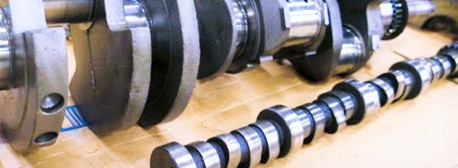
Most Diesel Repair Shops are started by Diesel Mechanics. They start the business because they are good at fixing diesel engines. In fact, they’re so good that usually they’re the best mechanic in the shop as well as the most productive. At some point, they get sick and tired of working for a boss that doesn’t know what he’s doing and doesn’t appreciate them. They often feel like they don’t make enough money, so they start their own Diesel Repair Shop; believing that because they are really good at repairing diesel engines, they will be an entrepreneur and be successful owning a Diesel Repair Business (maybe even better than most Diesel Repair Shops). This is where the problem begins, because it is a false belief.
Listen to the entire post in the podcast below, or read on after the audio for the full blog:
The truth is that an entrepreneur starts a business with investment capital because there is an opportunity to start a business that can make money based upon a need in that particular marketing area for a product or service. They write a plan to make money. They hire the mechanics. They hire the bookkeeper. They hire the marketing and advertising agency. They run the business making sure that all of those components are working perfectly.
When the Diesel Repair Shop gets started by the Diesel Mechanic, he begins by repairing diesel engines. He does a great job and then he gets a repeat customer. Before you know it, he’s busy. So busy in fact, that he has to go and hire another mechanic. Now he has two diesel mechanics; himself and the new hire.
Next thing you know, there is a tremendous amount of paperwork. Estimates have to be written, Invoices have to be written and sent out, Bills have to be paid, and taxes have to be calculated. As the Government has created more and more paperwork needs, the administrative end of the business usually becomes a nightmare. The Owner/Mechanic hires a bookkeeper. The bookkeeper ends up running the business. Why? Usually because the Diesel Mechanic is busy. Doing what? Repairing diesel engines because that’s what he does best.
For a while that goes on and it’s like a miracle because the bookkeeper is getting the paperwork done, the bills are getting paid, invoices are going out, and things are working pretty smoothly. In fact, thing are going along as if they are almost too good to be true. Then all of the sudden, one Saturday night, the Owner/Diesel Mechanic gets a call from the bookkeeper. Oh no! The bookkeeper announces that they’ve found another job and they are giving their two weeks’ notice. The Owner hangs up the phone, freaking out because there is no one to replace the bookkeeper. So he starts to try to find another bookkeeper. In the meantime; bills aren’t getting paid, paperwork is piling up, and customers are becoming unhappy.
One morning, the business owner doesn’t even want to get out of bed. His wife says, “Hey honey, it’s time to get up and go to work. What are you doing? Are you sick? How come you’re not going in?” He turns to his wife and he says, “I don’t want to go there anymore, I hate that business!” Over time, he starts to downsize. He becomes a one-man shop again, maybe having a little help here and there. Basically, he now has a job and not a business. If he doesn’t go to work, no work gets done and without any work getting done; there is no paycheck coming in. So he’s right back where he started.
All of this is avoidable with systems. Systems are the documentation, the step-by-step instructions, the policies and procedures that show how to:
- Hire
- Fire
- Motivate people so they get the work done on time
- Get the bills paid on time
- Set a Budget
- Plan accounts payable
- Complete payroll
- Improve marketing and sales to get the next customer
- Do efficiency studies to ensure that profitability goes up,
- Get more done, and so on and so forth
All large diesel repair shops that go on generation after generation have finally figured this out…
So now you own a larger diesel repair shop; you did survive, you have some systems in place, you have 2-3 diesel mechanics or more but now different problems start to creep up. It’s nothing new. You’ve seen it building over the years, except now it’s getting intolerable. The cost of paying those mechanics is increasing.
Why? Because:
- Minimum wage has gone up which has driven up the pay rate of every position in the shop.
- Taxes have gone up.
- Social security taxes have gone up.
- The rent has gone up.
- Insurance has gone up.
- Additional costs are incurred.
Now it is more difficult to make a profit in your business than it was before because of the many cost increases that keep adding on.
At the same time, Diesel Mechanics are becoming a rare breed. Not very many are coming out of school and as a result of that; there is a shortage of Diesel Repair Mechanics, at least the ones that you would want to hire because they’re trainable and they are going to do what you ask them to do. You need a Diesel Mechanic who is going to do a quality job to get the customer taken care of quickly, efficiently, and with quality work.
Running that kind of business in this generation has almost become obsolete because of technology. Not only technology but because we live in a different culture. Fewer people seem to want to work hard. As a result; growing that repair shop to a point where the valuation is such that it could be transferred to another owner or in other words, sold for a profit, becomes more difficult.
Most business valuation is driven by a return on investment. An outsider will want to get somewhere between 20%-30% of their investment during that transaction whether it’s another repair shop or it’s just another Mechanic who wants to buy out that business. If that business is not generating enough profit to give that return, the business cannot be sold. If the business can’t be sold; you end up liquidating the business which is a very painful, difficult, and financially destructive way to close out your career as a Diesel Repair Shop Business Owner.
If a Diesel Repair Shop Owner has an interest in turning this situation around and changing that outcome to pretty much guarantee that he’s going to get hundreds of thousands of dollars at the end of that business career because he’s able to transfer that business; we’re going to show how it can be done in this series.
By spending less than one hour per week, we are going to teach the owners of Diesel Repair Shops:
- How to Write a Strategic Objective
- How to Create an Organizational Plan, including Brief Job Descriptions
- The Amount of Pay Required for Each Position
- How Much Work Should be Expected from Each Position, along with the Measuring Tools Needed to Ensure that it is Happening
- Methods to Write a Simple but Effective Employee Manual along with Policies and Procedures
- A Marketing and Sales Plan to ensure that the Customers Continually Come
If a business with 4 or 5 Diesel Mechanics is generating $500,000 or more per year, it should be netting about $100,000. A purchase price of one to five times earnings is not out of the question. So if this formula is followed, it would be a reasonable expectation that the end result would be the sale of the business for somewhere between $100,000 – $500,000 plus assets.
If you aren’t seeing these results, give us a call or shoot us an email to find out how you can.



